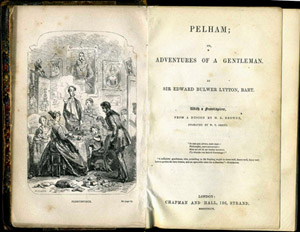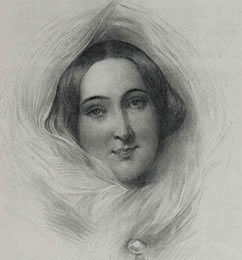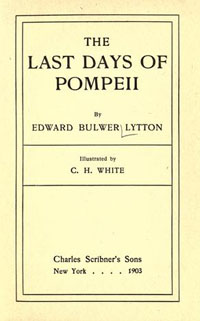Associated Locations:
- London, England
Associated Dates:
- May 25, 1803 – Born
Edward G. Lytton-Bulwer is one of the eminent spirits who appeared to President Wilford Woodruff in the St. George Temple (Latter-day Saint, LDS) on August 21, 1877. This interesting story is detailed in the Eminent Spirits Appear to Wilford Woodruff wiki.
“Lytton wrote over thiry novels and seven plays. Even though some of his earlier novels possessed the morbid sentimentalism that was popular during that age, he exerted a tremendous mental influence on the writers of the time. His later novels would rise above his earlier works to provide worthy models to follow.
Earnest, thoughtful, conscientious, and painstakingly accurate, Edward George Lytton-Bulwer was at the same time the most versatile author of his day.”1
| Edward G. Lytton-Bulwer | |
|---|---|
| Born | May 25, 1803(1803-05-25) London, England |
| Died | January 18, 1873(1873-01-18) (aged 69) Torquay, England |
| Spouse | Rosina Doyle Wheeler |
| Father | General William Earle Bulwer |
| Mother | Elizabeth Barbara Lytton |
Life Sketch from The Other Eminent Men of Wilford Woodruff
Copyright © Taken from the book: The Other Eminent Men of Wilford Woodruff. Special thanks to Vicki Jo Anderson. Please do not copy.
English Novelist, Politician 1803-1873
Lytton wrote over thiry novels and seven plays. Even though some of his earlier novels possessed the morbid sentimentalism that was popular during that age, he exerted a tremendous mental influence on the writers of the time. His later novels would rise above his earlier works to provide worthy models to follow.
Earnest, thoughtful, conscientious, and painstakingly accurate, Edward George Lytton-Bulwer was at the same time the most versatile author of his day.
“Personal liberty is the paramount essential to human dignity and human happiness.”
“Beneath the rule of men entirely great, the pen is mightier than the sword.” (Richelieu Act ii. Sc. ii.)
– Baron Edward George Lytton-Bulwer
Early Life
2“Out of jealousy for my mother’s love, my father had positively disliked me; for the same cause my my grandmother took me into open aversion; and me grandfather, who out if conscious of the future, to have welcomed and petted me, as the one of his grandsons destined to live the most amongst books, did not suffer me to be four-and twenty hours in the house before he solemnly assured his daughter “that I should break her heart, and (what was worse) that I should never know my A. B. C.” He maintained this ill opinion of my disposition and talents with the obstinacy which he carried into most of his articles of belief; and I cannot call to mind ever having received from him a caress or a kind word.”
Edward George Lytton-Bulwer wrote in a short autobiography that he was born at the saddest point of his mother’s married life.
In spite of such negative beginnings, his early life was not at all sorrowful. He spent these years alone with his mother, who lavished on him all the love that she could not share with her husband. Between the two was great affection and sympathy. His mother, would recite poetry, particularly that of Goldsmithand Gray, and would read from Homer stories of the siege of Troy, As the little boy listened, he was held captivated and began, even before he could write, to compose verses of his own. He wrote: “verse fell from my mother’s lips as the diamond rose from the lips of in the fairy tale. I marveled, and I mimicked. I hear “The tale of Troy divine, the deeds and death of Hector, and my soul was on fire.”
3It was from this mother’s devotion and from her efforts to compensate for a very pained situation that England gained one of her most prolific writers. Lytton is noted for his ability to hold his audience in archeological and historical novels, which were written with astonishing accuracy.
Lytton could converse and make rhyme even in his infant stage. He remembered:
“I used to hear them [the servants] prophesy in low tones of the brilliant futurity of Master Edward. There was one legend concerning me that always came out in the cativinations, and I repeat it because it had probably its lasting effect on my mind and therefore reacted on my fate. Once, when I was yet in arms, a man with a wild air abruptly stopped my nurse in the streets, and, looking upon me strangely, asked whose son I was. The nurse replied that I was the son of General Bulwer. The stranger then, with much solemnity, took me in his arms, and uttered a prophecy to the purpose that I was to be greater than my father, and sometimes remarkable.”4
Lytton noted that whether the man was sane or crazy, the maids repeated the incident so often that it influenced his actions and his ideas of the future. He felt that his life had been “entrusted with a mission to the hearts of beings unborn, and that in the long chain of thought connecting age with age my own being would hereafter be recognized as a visible link.”5
Education
When Lytton was seven years old his grandfather died, leaving a large library, for his grandfather had been a Latin scholar of some not,. The books were moved to the Lytton home, where young Lytton spent twelve months of ceaseless undirected reading. Reflecting on this experience Lytton said:
6“I was Solomon in all his glory, and surrounded by all … Where I found a book in English it sufficed for me, no matter how dry and how far above my reason; I still looked and lingered read and wondered … and there, when the flood settle, I rested my infant ark.”
The extraordinary energy, forge, and spirit seemed to drive him all his life. After a year or more such exploration he asked his mother: “Pray, are you not sometimes overcome by the sense of your own identity?”7 This comment prompted her to enroll him in a boys’ academy. As the smallest and youngest at the school he soon became the favorite target of a gang of bigger boys. His first night at the school, he was gagged and bound and banged against a tree. He was shocked at their low, gross slang and habits. He learned that with the unfeeling, feeling is a crime. His health all but gave way under the circumstances and his mother promptly removed him. Although his time at the school was short, it had an effect on his character. He later stated that it left on his mind a hatred of cruelty and oppression that never faded.
After this experience, he attended several other schools, finally staying at Dr. Hooker’s school; where the boys were gentleman, and he began to gain some direction in his studies. But school was not where he wanted to be, and he begged his mother to let him stay home and to give him a tutor. At last she relented.
In this village he loved to wander and one day he crossed two or three fields intent on settling down near a river. There he met a beautiful young girl who, since her mother and sister had died, was much at liberty as was Lytton. They consequently met each day by the banks of the Brent and fell deeply in love; they believed nature intended them for each other. She was well bred and gracious. One day, however, she did not meet Lytton nor the next nor the next. She had suddenly disappeared. Lytton fell into a Byronic state of overwhelming sadness.
Three years later the girl sent him a letter from her deathbed, explaining that her father had forcer her into a marriage with a man she never loved. She had tried to make it work and had been a devoted wife as best she knew to be. She hinted that the cause of her approaching death was a broken heart. Lytton visited her grave and after a night of meditating, he felt reborn, gaining a more healthful mind and dedicating in his life to literature. This experience, Lytton felt, helped him become more soft and gentle and his boyhood ambitions became subdued.
He attended Trinity College at Cambridge Hall, where ha devoted himself to reading history. He began keeping huge notebooks, which afterwards became the basis for his historical novels. After his studies, he left England and traveled throughout Europe studying French, writing Byronic poetry, and working on his first novel, Falklands.
In order to write, Lytton required intervals of complete solitude. This need may have influenced his unhappy marriage. Against his mother’s wishes, Lytton married a young lady who came from a sadly broken home. As he gained fame for his writing and on his appointment to Parliament, she gained a desire for luxuries. In order to sustain themselves Lytton had to write continuously, which meant he needed more time to himself. Interruptions often caused him to be short-tempered. While his wife was well provided for physically, she had little of his time. She didn’t suffer in silence. Two boys were born to their unfortunate marriage, which eventually fell apart.
Literary Career
England at tis time was in a state of ease, having won the battles at Trafalgar and Waterloo. Napoleon I was a prisoner at St. Helena, and the Bourbons were temporarily back on the throne in France. King George III, having gone insane, had died, and England was entering a period of peace that was to last one hundred years. In this state of affairs England began to expand her industry and to see extra ordinary intellectual achievement. Society too saw great changes.
It was upon these scenes that Lytton’s novel entered English society. Lytton son said that:
8“The satire of his earlier novels is a protest against false social respectabilities; the humor of his later ones is a protest against the disrespect of social realities. By the first he sought to promote social sincerity, and the free play of personal character; by the last, to encourage mutual charity and sympathy amongst all classes on whose interrelation depends the character of society itself.”
He entered politics and Parliament as a liberal, but as events changed, he became a conservative.
During his first nine years he worked in support of the Reform Bill, which supported local government by election. He also devoted his energies to develop laws to protect copyrights of original works, reducing the cost of postage, and laws affecting dramatic literature. He presented powerful speeches. In 1848, he became Secretary to the Colonies. While holding this office he organized the new colony of British Columbia. About this time he was twice elected Lord Rector of the University of Glasgow.
However his greatest contribution lay in his novels, plays, and essays. Evidence of his versatile talent and indefatigable industry appear in almost every department of literature. But his novels, his historical romance novels affected society the most. The expression, romantic, in Websters 1828 dictionary meant “to rise over, to soar, to reach to a distance, to divine, to romance.” So it was with Lytton’s novels. His Last Days of Pompeii was his most popular novel. Of his plays, The Lady of Lyons and Money held the stage the longest, the latter being preformed into the twentieth revolutions, rebellions, and dethromenets, one following anpther so rapidly that, acording to on crictic, there was enough historical material to make three novels.
Death of Lytton’s Mother
In 1843, Lytton’s mother died. Her death was a terrible shock to him. Of her he said, “No one else knew my mother as I did, and I never till now knew half her great qualities and noble heart….After they said she was dead I felt her hand press mine. … I sought for escape. The physicians said ‘travel’ …. I had … to fly into the other world of books, or thought or reverie.”9 He was able to overcome his loss because he could return to his writing.
Lytton wrote over thiry novels and seven plays. Even though some of his earlier novels possessed the morbid sentimentalism that was popular during that age, he exerted a tremendous mental influence on the writers of the time. His later novels would rise above his earlier works to provide worthy models to follow.
Earnest, thoughtful, conscientious, and painstakingly accurate, Edward George Lytton-Bulwer was at the same time the most versatile author of his day.
Copyright © Taken from the book: The Other Eminent Men of Wilford Woodruff. Special thanks to Vicki Jo Anderson. Please do not copy. 10
- The Other Eminent Men of Wilford Woodruff. Special thanks to Vicki Jo Anderson. Please do not copy.
- Commerce, Anne. Something About the Author. Detriot, Mich.: Gale Reasearch Company Book Tower. 1981, 23:126
- Lytton, the Earl of, by His Grandson. The Life of Edward Bulwer, First Lord of Lytton. London: Macmillian and Co., 1913, p. 23.
- Ibid., p. 26
- Ibid., p. 27
- Lytton, Bulwer-Lytton, p. 15.
- Ibid., p. 16.
- Lytton, Edward Bulwer Lytton, Baron (son of Edward Lytton-Bulwer). The Works of Edward Bulwer-Lytton. New York: P. F. Collier and Son ,1901, p. 21.
- Commerce, p. 130
- Anderson, Vicki Jo. (1994). The Other Eminent Men of Wilford Woodruff. Cottonwood, AZ: Zichron Historical Research Institute.










